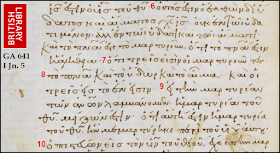I understand you are persuaded by this information. There is absolutely no evidence that it has any origin in the Greek.
Pickering's translation note: "Those who use the AV or NKJV are used to: “There are three that bear witness in heaven: the Father, the Word, and the Holy Spirit; and these three are one. And there are three that bear witness on earth: the Spirit, the water, and the blood; and these three agree as one.” The words in italics are only found in five late Greek manuscripts (less than 1% of the total) and part of the Latin tradition, from which they came. To be more precise, the manuscripts are: (61)[16th], (629)[14th], (918)[16th], 2318 [18th], 2473 [17th], wherein the cursives in ( ) all differ from each other; the two that agree verbatim with TR were probably copied from it. The only one that is clearly early enough to have served as TR’s exemplar, 629, is far too different—it lacks the seven last words in TR, omits another five, changes five and adds two—19 out of 40 words is too much; the Textus Receptus is not based on cursive 629, so it must be a translation from the Latin (or its exemplar is lost). The shorter reading makes excellent sense. [Those who make ‘the three heavenly witnesses’ a litmus test for orthodoxy are either ignorant or perverse (or both).]"
The shorter sentence without Comma doesn't make sense.
Oi Treis for the masculine
Spirit, Water, Blood, these 3 gentlemen are one, does this make sense?
I know the manuscripts supporting the Comma are later dated
629 (14th century)
61 (16th century)
918 (16th century)
2473 (17th century)
2318 (18th century)
221 margin (10th century, Comma added later)
635 margin (11th century, Comma added later)
88 margin (12th century, Comma added in 16th century)
429 margin (14th century, Comma added later)
636 margin (15th century, Comma added later)
177 margin (11th century, Comma added later)
But these were copied from the copies which were far older dated than the copies without the Comma.
Old Latin Bible preserved thru the Waldensians contained it.
Old Latin has nothing to do with the vulgate but was preserved by the Albigenes and Waldensians since 157AD
Many scholars like Cyprian quoted it.
The gnosists, Sabelians succeeded in eliminating the comma from so many copies, but couldn't remove it from the exegeses of many scholars.
Satan has worked hard to pervert the Words of God and destroyed many copies of the Bible.
We need to discern what are the true Words of God.
In fact there is no scriptural rule that NT was written in Greek. Gospel Matthew was written in Hebrew as many testified it.
Acts 21:40 says Paul delivered a speech in Hebrew. Where is the Hebrew address now?
Antioch was the centre for the translation of the Bible into many languages and copying the Bibles
If Greek copies failed in preserving the Words of God, then other copies in other languages can be used.
Gnosis and the Sabelianism hated the Comma and removed it from the most of the copies of the bible
Moreover, as I said, the lack of the Comma causes a serious problem with the Greek Grammar.
Eliyahu

